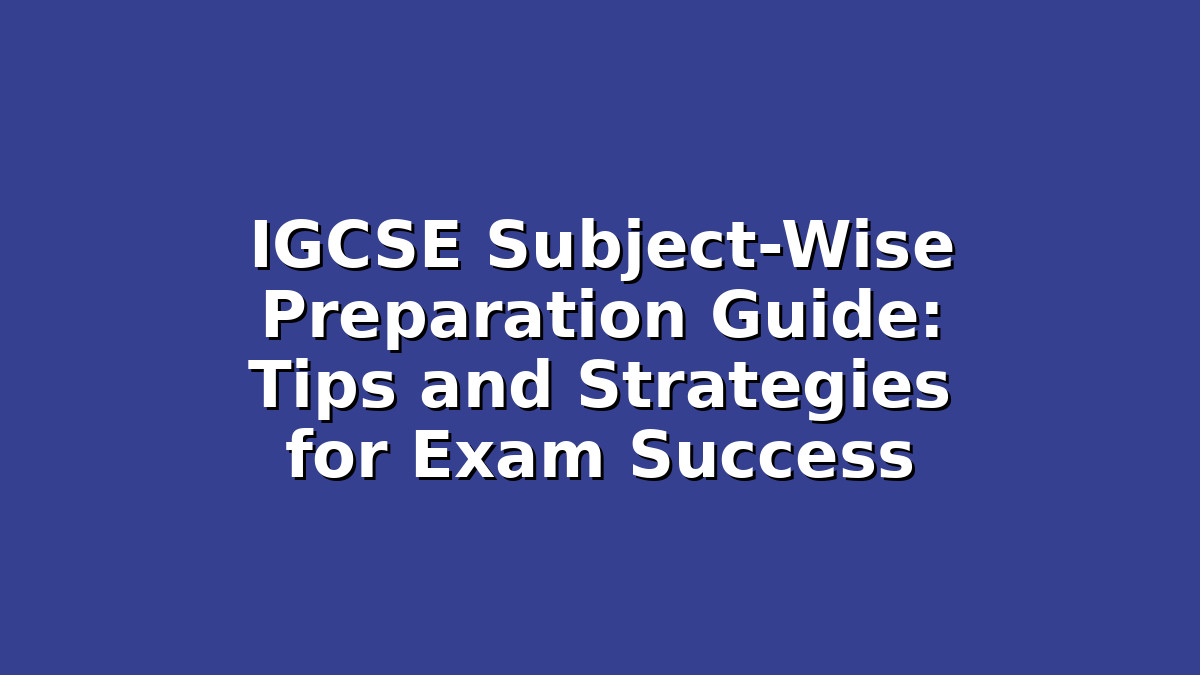Preparing for the IGCSE exams can feel overwhelming, especially when you have multiple subjects to cover. Each subject requires different skills, knowledge, and study techniques to excel. Whether you’re revising for Mathematics, Sciences, Languages, or Humanities, having a clear, subject-wise preparation plan can boost your confidence and improve your exam performance. This guide offers practical tips and strategies tailored to popular IGCSE subjects, helping you organize your study sessions effectively and make the most of your revision time.
Understanding the IGCSE Exam Structure
Before diving into subject-specific advice, it’s important to understand the general format of IGCSE exams. Most subjects combine written papers, practical assessments, and coursework, depending on the subject. The syllabus for each subject is divided into topics, which you must master to do well. Time management, regular revision, and practice using past papers are essential cornerstones for success. With that foundation, you can now explore how to approach different subjects strategically.
—
1. Preparing for Science Subjects (Biology, Chemistry, Physics)
Science subjects test your conceptual understanding as well as your ability to apply knowledge in experiments and problem-solving.
Understand the Syllabus and Concepts Thoroughly
Start by reviewing your syllabus and identifying the key topics. Science subjects often build on foundational concepts, so make sure you fully understand earlier topics before moving on. Use your textbook, class notes, and online resources like videos or quizzes to reinforce your understanding.
Make Visual Aids and Summaries
Science involves complex processes and data. Create mind maps, flowcharts, and diagrams for topics like the human circulatory system (Biology), chemical reactions (Chemistry), or motion and forces (Physics). Visual aids help you memorize and recall information quickly during exams.
Practice Past Papers and Experiment Questions
Regularly solve past exam questions to familiarize yourself with the question types and time constraints. Many science exams include practical or data analysis questions, so practice interpreting charts, graphs, and experimental results. If your course has a practical component, review your lab work thoroughly and understand the procedures and outcomes.
—
2. Tackling Mathematics and Problem-Solving Subjects
Mathematics requires consistent practice and a clear understanding of formulas, methods, and problem-solving techniques.
Master the Basics Before Moving to Advanced Topics
Ensure your fundamentals—like arithmetic, algebra, and geometry—are strong since these are the building blocks for complex problems. If you find any topic challenging, revisit it early to avoid gaps in knowledge.
Use a Step-by-Step Approach in Solving Problems
When practicing problems, write down each step clearly rather than jumping to the answer. This helps you track errors and develop problem-solving logic. For word problems, underline key information and identify what the question is asking before attempting to solve it.
Regularly Time Yourself and Practice Past Papers
Timed practice helps simulate exam conditions, improving your speed and accuracy. Attempting past papers under exam conditions will help reduce anxiety on the exam day and improve your time management skills.
Use Additional Resources for Extra Practice
Besides school textbooks, use online platforms like Khan Academy or IGCSE-specific websites for extra problem sets and video tutorials. These resources often provide alternative explanations that might resonate better with you.
—
3. Excelling in Languages and Humanities (English, History, Geography)
Subjects that rely on writing, memorization, and critical thinking require a unique approach focused on comprehension, analysis, and organization.
Enhance Your Reading and Writing Skills Daily
For English and language subjects, read widely—from novels and newspapers to essays—and practice writing essays, summaries, and reports regularly. This will improve vocabulary, grammar, and your ability to communicate ideas clearly and coherently.
Use Timelines, Flashcards, and Summary Notes for History and Geography
Create timelines for historical events or flashcards for geographical terms and definitions. Summarize each topic in your own words to ensure you understand key concepts instead of just memorizing facts. Linking concepts together—like causes and effects in history or physical processes in geography—helps you write better answers.
Practice Past Papers and Plan Your Answers
Use past exam papers to familiarize yourself with question formats. Practice planning your essays or extended responses with outlines, which can improve the clarity and structure of your answers. Writing practice also helps build stamina for longer exam papers.
Participate in Group Discussions or Study Groups
Discussing topics with peers can deepen your understanding and expose you to different perspectives. It also keeps revision engaging and helps clarify difficult concepts.
—
Conclusion: Your Roadmap to IGCSE Success
Preparing for IGCSE exams is a marathon, not a sprint. Start early, create a revision timetable that balances all your subjects, and stick to it consistently. Use active learning techniques—such as summarizing, self-testing, and practicing past papers—to reinforce your knowledge and improve retention. Remember to take regular breaks to avoid burnout and maintain a healthy study-life balance.
Approach each subject with confidence and a positive mindset. Every hour you invest in preparation brings you closer to your goals. Believe in your abilities, stay organized, and don’t hesitate to seek help from teachers or peers when needed. With the right strategies and determination, you can excel across all your IGCSE subjects and build a strong foundation for your future education.
Good luck with your exams—you’ve got this!

Responses